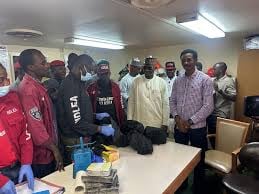FG Remains Silent as Port Concession Renewals Stall for Over 4 Years
More than four years after several port terminal concession agreements expired, the Federal Government of Nigeria has maintained a deafening silence, raising concerns over possible political interference, corruption, and regulatory delays.
Investigations by Shipping Position Daily reveal that multiple terminal operators—whose concessions in major Nigerian ports such as Apapa, Tin Can Island, Onne, and Port Harcourt expired as far back as 2021—continue to operate key port assets without valid contractual backing. Industry experts warn that this situation poses a threat to transparency, legal compliance, and investor confidence.
The protracted delay has become a national issue, with insiders suggesting that the upcoming 2027 elections may be influencing decisions about which terminal operators get their concessions renewed or revoked.
“It’s essentially a political waiting game,” said a highly placed maritime analyst who preferred anonymity. “The government seems to be stalling deliberately to assess loyalty and political alignment before making any renewal decisions.”
In August 2024, the Minister of Marine and Blue Economy, Mr. Adegboyega Oyetola, assured Shipping Position Daily that the renewal process was underway and would be concluded soon. “We are actively working on renewing these concessions, and the process will be wrapped up very shortly,” he stated. However, nearly a year later, no renewals have been announced, no bidding process initiated, and the ministry has issued no official updates on the status of the expired agreements. Meanwhile, operators continue to run port terminals worth billions, in a legal grey area that experts warn could lead to serious complications.
In March 2025, Shipping Position Daily reported that the Nigerian government was unlikely to renew some concessions, citing poor performance, lack of infrastructure investment, and a damaging World Bank report that called for a complete overhaul of the port concession system.
A senior official at the Ministry of Marine and Blue Economy disclosed to this publication: “Many operators are essentially milking the government’s assets without reinvesting. The World Bank report even recommended a total overhaul. It doesn’t make sense for the government to pour billions into port upgrades and then hand over to underperforming operators again.”
The official also claimed that some terminal operators had attempted to influence the minister using underhanded tactics, but failed due to his stance on transparency. “They won’t tell you how little they pay the government, but they’re quick to accuse us of delays. Even under Buhari’s administration, renewals were rejected because they failed to deliver value.”
In a recent off-the-record conversation, another official from the Ministry confirmed that there are no new updates on the concession renewals after more than four years. “There may have been some minor developments about six months ago, but these things involve processes,” the official explained. “Once we have concrete information, we will communicate it. For now, it’s a matter of waiting.”
The official hinted that ongoing port modernisation projects could be contributing to the delay. “The government has ongoing contracts for port upgrades and modernisation, and the procurement process is still ongoing. Once there are updates regarding concessions, I will share them,” he assured.
It’s worth noting that the previous Buhari administration chose not to renew several concessions due to underperformance and failure to meet contractual obligations. Despite efforts by operators to secure renewals from the current government, these have been unsuccessful thus far. Industry insiders warn that operating port terminals without valid legal agreements exposes Nigeria’s economy to risks.
“The ports are the gateway to Nigeria’s economy. If the legal basis for terminal operations is uncertain, the entire supply chain is at risk,” said a maritime lawyer who requested anonymity.
With mounting political pressures, stalled infrastructure investments, and increasing scrutiny from international observers, stakeholders fear the delay might undermine the achievements of Nigeria’s 2006 port concession reforms—once hailed as a South-Saharan model for public-private partnerships.
“The government needs to be clear,” an industry stakeholder emphasised. “Either renew or revoke concessions. Keeping everyone in limbo only damages the industry’s credibility and future growth.”



